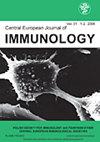基于 Notch 信号通路的膀胱癌分类与肿瘤免疫浸润的关系
IF 1.6
4区 医学
Q4 IMMUNOLOGY
引用次数: 0
摘要
导读:Notch信号通路在各种肿瘤发生发展中的作用已受到越来越多的关注,但Notch信号通路与膀胱癌预后的关系却鲜有研究。本研究旨在探讨Notch信号通路相关基因(NRGs)在膀胱癌中的功能和风险评估价值。膀胱癌数据集来自癌症基因组图谱(TCGA)数据库。采用 Cox 回归分析和 Lasso 回归分析构建预测膀胱癌患者总生存期的特征。结果显示:NRG在膀胱癌中的表达明显失调。根据 NRG 的表达水平,膀胱癌被分为两个亚型(C1 和 C2)。这两种亚型的预后差异显著,且与临床特征密切相关。结论:基于Notch信号通路的膀胱癌分型具有不同的预后,可能与肿瘤免疫有关。NRGs可用于风险评估,有助于改善临床决策。本文章由计算机程序翻译,如有差异,请以英文原文为准。
Notch signaling pathway-based classification of bladder cancer in relation to tumor immune infiltration
Introduction:
The role of the Notch signaling pathway in the development of various tumors has received increasing attention, but the relationship between the Notch signaling pathway and the prognosis of bladder cancer has rarely been studied. The aim of this study was to investigate the function and risk evaluation value of Notch signaling pathway-related genes (NRGs) in bladder cancer.
Material and methods:
The list of genes related to the Notch signaling pathway was obtained from the molecular signature database. The bladder cancer dataset was obtained from The Cancer Genome Atlas (TCGA) database. Cox regression analysis and Lasso regression analysis were used to construct the characteristics for predicting the overall survival of patients with bladder cancer. The CIBERSORT algorithm was used to evaluate the infiltration of peripheral immune cells in different risk subgroups.
Results:
NRG expression was remarkably dysregulated in bladder cancer. Next, bladder cancer was classified into two subtypes (C1 and C2) based on NRG expression levels. The two subtypes had a significant difference in prognosis and were closely related to clinical characteristics. Further analysis showed that immune cell infiltration and immune scores were also significantly different between the two subtypes.
Conclusions:
Notch signaling pathway-based bladder cancer typing has different prognoses and may be related to tumor immunity. NRGs can be identified for risk evaluation and help improve clinical decision-making.
The role of the Notch signaling pathway in the development of various tumors has received increasing attention, but the relationship between the Notch signaling pathway and the prognosis of bladder cancer has rarely been studied. The aim of this study was to investigate the function and risk evaluation value of Notch signaling pathway-related genes (NRGs) in bladder cancer.
Material and methods:
The list of genes related to the Notch signaling pathway was obtained from the molecular signature database. The bladder cancer dataset was obtained from The Cancer Genome Atlas (TCGA) database. Cox regression analysis and Lasso regression analysis were used to construct the characteristics for predicting the overall survival of patients with bladder cancer. The CIBERSORT algorithm was used to evaluate the infiltration of peripheral immune cells in different risk subgroups.
Results:
NRG expression was remarkably dysregulated in bladder cancer. Next, bladder cancer was classified into two subtypes (C1 and C2) based on NRG expression levels. The two subtypes had a significant difference in prognosis and were closely related to clinical characteristics. Further analysis showed that immune cell infiltration and immune scores were also significantly different between the two subtypes.
Conclusions:
Notch signaling pathway-based bladder cancer typing has different prognoses and may be related to tumor immunity. NRGs can be identified for risk evaluation and help improve clinical decision-making.
求助全文
通过发布文献求助,成功后即可免费获取论文全文。
去求助
来源期刊

Central European Journal of Immunology
IMMUNOLOGY-
CiteScore
3.00
自引率
0.00%
发文量
17
审稿时长
6-12 weeks
期刊介绍:
Central European Journal of Immunology is a English-language quarterly aimed mainly at immunologists.
 求助内容:
求助内容: 应助结果提醒方式:
应助结果提醒方式:


